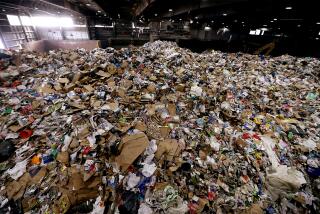Recycle Cardboard From Auto Assembly Plant : Honda Workers Make Cash From Trash
- Share via
MARYSVILLE, Ohio — Five employees of the Honda automobile plant who tackled a $500,000 annual waste problem say their biggest obstacle was to persuade management that they could do it.
Now, after two years of meeting after hours and between shifts, talking to management, finding contractors, contacting fellow workers and working with Honda’s legal department, the five have put their idea to work.
And they thought it was such a simple thing: Save waste cardboard and sell it.
They had watched for years as cardboard was compacted into trash trucks along with Styrofoam, plastic and floor sweepings and taken to a landfill.
‘It Was a Shame’
“A couple of us were talking one day about the tons of cardboard and Styrofoam being thrown away every day and we thought it was a shame,” said Fred Farley, one of the five members of the Waste Watchers NH (New Honda) Circle. They are among about 400 workers in Honda’s Material Service section that unpack car parts and see that they get onto conveyor belts to the assembly line.
One of them wondered aloud if they could sell the trash. Several co-workers drank coffee over the idea a few times before forming an NH-Circle, one of 151 such employee groups involving about 25% of the plant’s 4,750 workers.
“When we first started it was a big deal, and management was hesitant,” said Don Ferguson, a Waste Watchers team member. “They wondered if we could handle it.”
Research shows that cardboard makes up 55% of the nearly 90 tons of trash that leave the auto assembly plant every working day. Nearly all parts for the cars, from ashtrays and seats to windshields and trunk lids, arrive in cardboard boxes.
A little arithmetic helped the five conclude that the 50 tons of cardboard being trashed daily made recycling worthwhile.
Worth $159,000
In the first 13 weeks it was worth $159,000 to Honda in trash sold for recycling and savings on the previous cost of having it hauled to a landfill.
From conception to inception was a long, sometimes hard, road for Farley, of Bellefontaine; Larry Hannan, Ferguson, Caesar Chilton and Charles Jackson, all of Springfield.
Their project was chosen by Honda as a winner among NH-Circles. The payoff was a trip to Japan for Farley, Hannan and Ferguson to tell a Honda world convention how they made the idea a reality.
The NH-Circle is a throwback to the early industrial era, when employees worked out industry problems on the factory floor, and knew that management would listen to them.
“Once the associates (Honda talk for employees) become involved, we let them run a project from start to finish,” said Bill Hayes, assistant manager-administration for voluntary involvement programs. “We’re strong on getting everyone involved.”
No Additional Manpower
“We didn’t have any additional manpower to help us,” Farley said, “no budget for people or equipment.”
They talked a Honda subsidiary, Honda International Trading Corp., into buying trash-compacting equipment, to be paid for with proceeds from the sale of waste cardboard.
“Ten percent of the income is a brokerage fee and 90% is used to pay for the equipment,” Ferguson said. “When it’s paid for, that 90% will come back to our department as profit.”
Those involved agree that money is the main incentive, because Honda has an annual profit-sharing payout to its associates.






